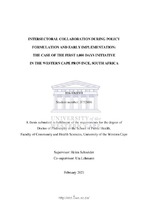| dc.contributor.advisor | Schneider, Helen | |
| dc.contributor.author | Okeyo, Ida | |
| dc.date.accessioned | 2021-05-26T07:41:45Z | |
| dc.date.available | 2021-05-26T07:41:45Z | |
| dc.date.issued | 2021 | |
| dc.identifier.uri | http://hdl.handle.net/11394/8261 | |
| dc.description.abstract | Intersectoral collaboration for health is widely recognised as a critical component of interventions to address complex public health issues. However, there is limited research that has examined how intersectoral approaches are formulated and implemented, especially in low- and middle-income countries. As a result, although the literature is populated with calls for action, little exists that can inform the evidence on how to sustain intersectoral action for health.
This thesis is a case study of intersectoral action in the Western Cape Province of South Africa, examining the unfolding policy formulation and implementation processes of an initiative referred to as First 1,000 Days, in the period 2016 to 2019. Within early childhood, the First 1,000 Days (FTD) period presents a favourable window for intersectoral interventions that can ensure positive outcomes from early years of life to adulthood. The FTD initiative emerged in the Western Cape Province of South Africa in response to the growing number of children exposed to the social challenges of violence and of alcohol and drug abuse. | en_US |
| dc.language.iso | en | en_US |
| dc.publisher | University of Western Cape | en_US |
| dc.subject | Actors | en_US |
| dc.subject | Intersectoral collaboration | en_US |
| dc.subject | Policy adoption | en_US |
| dc.subject | Western Cape province | en_US |
| dc.subject | Institutions | en_US |
| dc.title | Intersectoral collaboration during policy formulation and early implementation: The case of the first 1,000 days initiative in the western cape province, South Africa | en_US |
| dc.rights.holder | University of Western Cape | en_US |

